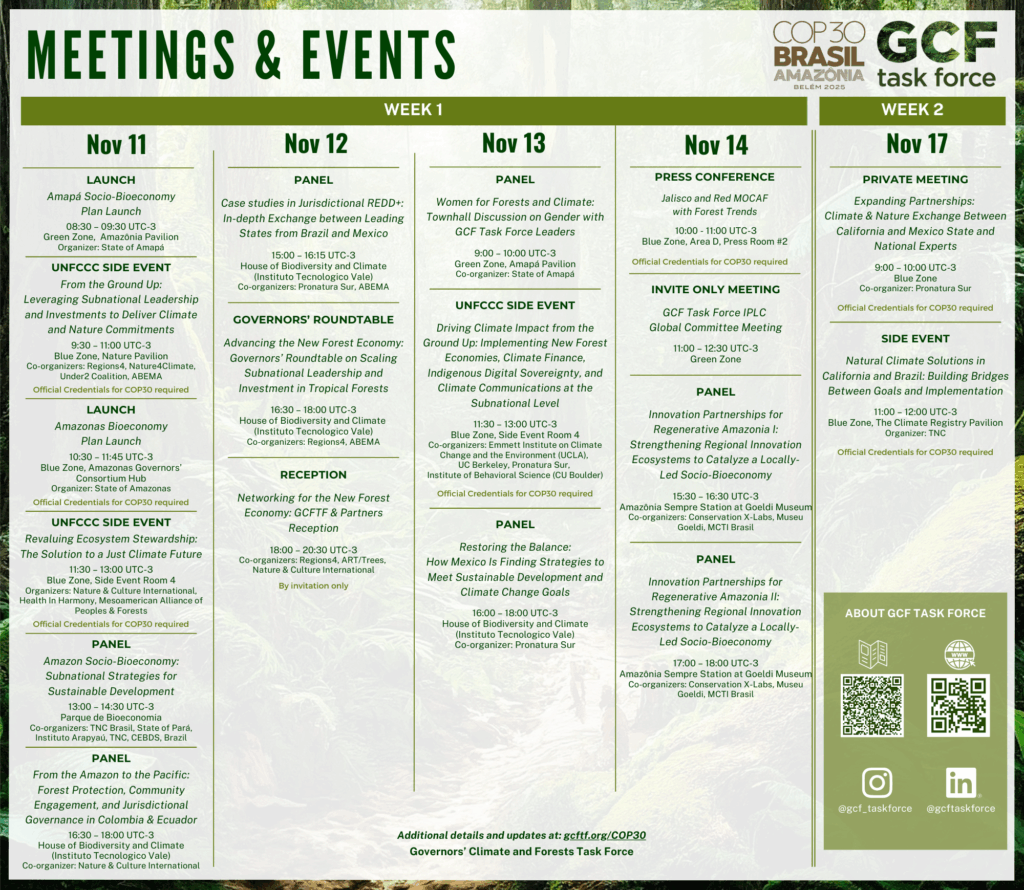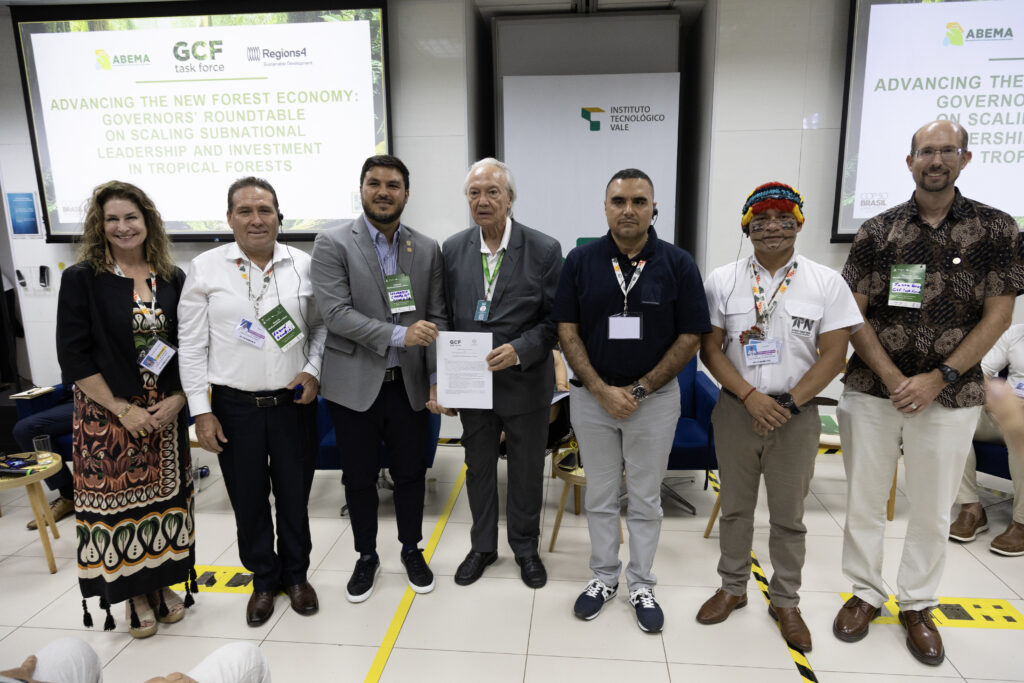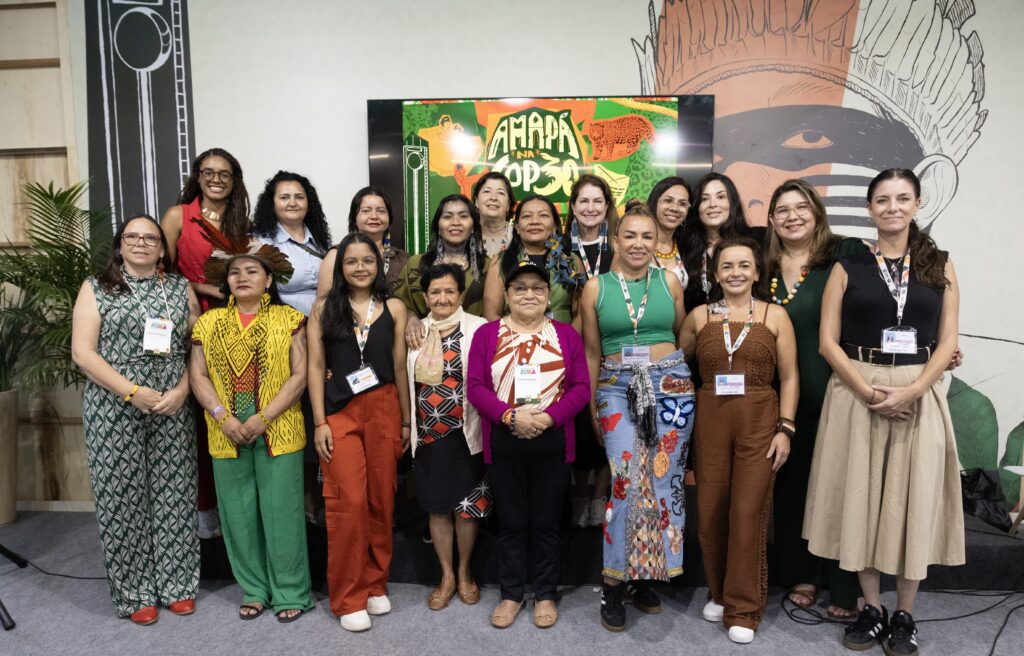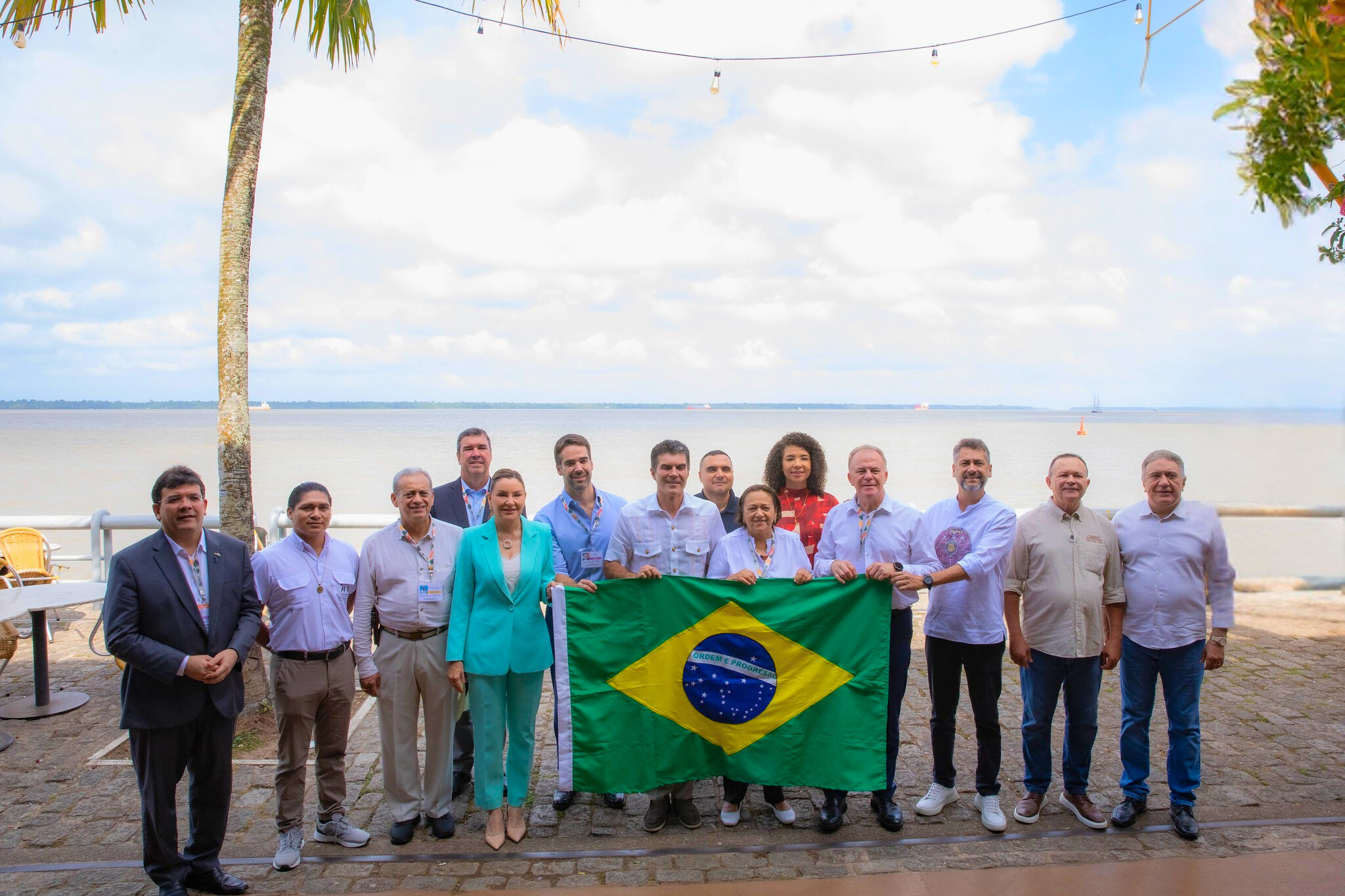Governors’ Meeting, Nov. 12, 2025 (Photo: Consórcio da Amazônia Legal)
In November 2025, the 30th UN Climate Change Conference of the Parties (COP30) took place in Belém in the Brazilian state of Pará, a founding member of the Governors’ Climate and Forests Task Force (GCFTF). COP30 was dubbed “Implementation COP,” as it has been 10 years since the Paris Agreement was adopted at COP21, and it is imperative that we now turn our plans into actions. Thanks in part to the long-time efforts of the GCFTF, there was also a lot of focus on subnational climate leadership and Indigenous rights and leadership.
Tiyua Uyunkar, former President of the Achuar Nation and current Prefect of the Province of Morona Santiago, Ecuador, a GCFTF member jurisdiction, stressed the importance of the work we do when he said:
“If we are destroying nature, we are destroying the future of life around the world.”
At COP30, the GCFTF and our member jurisdictions were hard at work to protect nature, especially tropical forests, not only for the future of the people living in them but for the world at large.
COP30 Local Leaders Form – Rio de Janeiro, Brazil
The GCFTF kicked off our COP30 participation at the Local Leaders Forum, an event organized by Bloomberg Philanthropies and the COP30 Presidency. The Forum took place in Rio de Janeiro, Brazil on November 3-5, bringing together subnational leaders from around the world to share solutions, strengthen partnerships, and showcase how local action drives global climate progress. The following Governors and Environment Secretaries from GCFTF regions represented their jurisdictions and the GCFTF as a whole by participating in panel discussions, plenary remarks, closing ceremonies, and bilateral sessions:
- Governor Manuel Gambini (Ucayali, Perú)
- Prefect Tiyua Uyunkar Kaniras (Morona Santiago, Ecuador)
- Governor Antonio Pulgar (Huánuco, Perú)
- Governor Jorge Rene Chavez Silvano (Loreto, Perú)
- Deputy Secretary for the Environment Renata Silva e Souza (Acre, Brazil)
- Secretary of Natural Resources Wade Crowfoot (California, USA)
- Secretary of the Environment Leonardo Carvalho (Acre, Brazil)
In addition, Carlos Aragon, GCFTF Brazil Director, participated throughout the events to provide perspective from the GCFTF Secretariat and to support our members in their engagement. All the participants worked to advance the New Forest Economy, present partnership proposals for long-term sustainable financing, and attract investment to accelerate the implementation of their jurisdictional decarbonization and forest protection programs. In organizing a States and Regions Summit on November 4, the GCFTF partnered with sister subnational networks, including the Under2 Coalition, Regions4, ABEMA, U.S. Climate Alliance, iCS, and the European Committee of the Regions. The Forum concluded with participants presenting a unified subnational climate agenda and affirming their collective commitment to advancing real, on-the-ground climate solutions by issuing the COP30 Local Leaders Forum Joint Outcome Statement.
COP30 – Belém, Brazil
Following the momentum of the Local Leaders Forum, the GCFTF organized an important presence of governors, senior delegates, Indigenous peoples and local community leaders, and partners across nearly two dozen panels, bilateral meetings, and side events at COP30 between November 11 – 20! We were also joined by prospective members, including Governor Nubia Cordoba (Choco, Colombia) and Prefect Marcelo Jaramillo Calle (Cañar, Ecuador). Our full COP30 schedule with participant information can be found here.

High-level Roundtables
Our COP30 events included three Governor-level roundtables focused on leveraging subnational leadership to advance the New Forest Economy:
- On November 11, we partnered with Regions4, Nature4Climate, Under2 Coalition, and ABEMA for an official UNFCCC Side Event titled “From the Ground Up: Leveraging Subnational Leadership and Investments to Deliver Climate and Nature Commitments.” Natalie Uribe (Regions4 Secretary General) moderated this truly international panel with representatives from Canada, Scotland, Brazil, South Africa, Spain, Azerbaijan, and Ecuador. The GCFTF was represented by:
- Governor Helder Barbalho (Pará, Brazil)
- Governor Wilson Lima (Amazonas, Brazil)
- Carlos Aragon (GCFTF Brazil Director)

- On November 12, we again partnered with Regions4 and ABEMA to host a high-level meeting: “Advancing the New Forest Economy: Governors’ Roundtable on Scaling Subnational Leadership and Investment in Tropical Forests.” Jason Gray (GCFTF Project Director), Colleen Scanlan Lyons (GCFTF Senior Director), and Natalia Uribe (Regions4 Secretary General) moderated the roundtable featuring:
- Governor Manuel Gambini (Ucayali, Perú)
- Governor Luis Francisco Ruiz (Caquetá, Colombia)
- Prefect Tiyua Uyunkar (Morona Santiago, Ecuador)
- Governor Nubia Cordoba (Choco, Colombia)
- Prefect Marcelo Jaramillo Calle (Cañar, Ecuador)
- Andreas Dahl-Jørgensen (Special Envoy, Climate and Forests / Director, Norway’s International Climate and Forest Initiative)
- Secretary of the Environment Paola Bauche (Jalisco, Mexico)
- Secretary of the Environment Eduardo Taveira (Amazonas, Brazil)
- Secretary of the Environment Taisa Mara Morais Mendonça (Amapá, Brazil)
- Secretary of the Environment Leonardo das Neves Carvalho (Acre, Brazil)
- Secretary of the Environment Alejandro Mendez (Michoacán, Mexico)
- Sub-Secretary of the Environment Nasly Fernanda Vidales (Valle del Cauca, Colombia)
- Senator Henry Stern (California, USA)
- On November 13, we held another official UNFCCC Side Event in conjunction with the Emmett Institute on Climate Change and the Environment (UCLA), the Eric and Wendy Schmidt Center for Data Science & Environment (UC Berkeley), Pronatura Sur, and the Institute of Behavioral Science (University of Colorado Boulder). This side event brought together Governors, academics, Indigenous leaders, and Environment secretaries, covering challenges and opportunities around forest governance, communications and data sovereignty, community leadership and the need for more partnerships, and climate and forest finance. Panelists included:
- Governor Luis Francisco Ruiz (Caquetá, Colombia)
- Governor Nubia Cordoba (Choco, Colombia)
- Governor Marcos Rocha (Rondônia, Brazil)
- Governor Manuel Gambini (Ucayali, Perú)
- Secretary of the Environment Eduardo Taveira (Amazonas, Brazil)
- Secretary of the Environment Paola Bauche (Jalisco, Mexico)
- Secretary of Indigenous Peoples Francisca Arara (Acre, Brazil)
- Secretary of the Environment Alejandro Mendez (Michoacán, Mexico)
- Sub-Secretary of the Environment Nasly Fernanda Vidales (Valle del Cauca, Colombia)
- Sergio Graf Montero, Director General, Comisión Nacional Forestal (CONAFOR; Mexico)
- Fermin Chimatani, President, La Asociación Nacional de los Ejecutores de Contratos de Administración de las Reservas Comunales del Perú (ANECAP)
- Matt Clark, Executive Director, Nature & Culture International (NCI)
- Max Boycoff, Professor, University of Colorado Boulder
- McKalee Suzanne Steen, Graduate Researcher, Eric and Wendy Schmidt Center for Data Science & Environment at UC Berkeley
The Power of Subnational Leadership and Cooperation
Subnational leadership and cooperation were at the forefront of discussions at our events and throughout COP30. Some key messages coming from these events were:
- Subnational leadership is paramount to the effective implementation of climate action from the jurisdictional level to the regional level.
- We supported the launches of two state socio-bioeconomy plans: Amapá and Amazonas, Brazil.
- We supported the launch of the High-Integrity Carbon Projects in the Brazilian Amazon – Practical Guide on Legal Compliance and Socio-Environmental Safeguards. The guide was developed with the governments of neighboring Amazonian states, Acre and Rondônia, as part of the Voluntary Carbon Markets Integrity Initiative’s Access Strategies Program. Members of the guide’s working group included the Amazon Investor Coalition (AIC), Climate Focus, LACLIMA, and the GCFTF.
- Subnational governments – and Governors – have solutions ready to go. They are already implementing actions from titling Indigenous territory to developing benefits sharing centered around robust consultation and partnership principles.
- Governor Wilson Lima (Amazonas, Brazil) shared that their state program, Forest Guardians, provided payments for protecting environmental services to 14,000 families.
- Connections are key. We highlighted the importance of connections across biomes in a panel co-organized with Nature & Culture International: “From the Amazon to the Pacific” (Nov. 11). Connections across our Mexican member states were particularly evident, and they had a strong presence at many events, including our panel on how Mexico is finding strategies to meet sustainable development and climate change goals (Nov. 13).
GCFTF jurisdictions presented valuable lessons on how to ensure policies and actions are not just serving one jurisdiction, but rather serve as important examples that can be adapted, replicated, and scaled.
Indigenous Peoples and Local Communities at COP30

As COP30 took place in the heart of the Amazon, it is no surprise that it had the most participation of Indigenous Peoples of any COP to date. There is still much work to be done, however, and some of the issues discussed were:
- Communication must be transparent, clear, and centered on recognizing the role of communities.
- Respect for Indigenous and local community knowledge and data is key. Taking actions and assessing impact also require acknowledging data sovereignty and territorial expertise.
- Recognizing and securing land tenure rights is one of the most important climate and forest protection solutions available.
For our part, we convened a planning session of the GCFTF Global Committee of Indigenous Peoples and Local Communities. The Committee agreed to hold a virtual meeting in December 2025 to advance a joint workplan for the sustainability of the committee, both thematically and financially, which will be finalized at GCFTF’s upcoming Annual Meeting in Caqueta, Colombia in May 2026. We also provided support to Prefect Tiyua Uyunkar (Morona Santiago, Ecuador) when he was invited to represent GCFTF governors in a meeting with the UNFCCC Secretary General.

In addition, a new MOU was signed between Jalisco, Mexico, a GCFTF member state, Forest Trends, and Red MOCAF (Red Mexicana de Organizaciones Campesinas Forestales), an NGO that promotes community forestry and supports Indigenous and farmer organizations in Mexico. Red MOCAF’s president, Gustavo Sanchez, also serves as the representative of the Alianza Mesoamericana de Pueblos y Bosques in the Global Committee. The MOU is aimed at strengthening collaboration and ensuring inclusive and transparent processes with respect to the involvement of Indigenous Peoples and Local Communities in Jurisdictional REDD+ processes.
Forest Financing
Several of our panels featured discussions on climate finance. The consensus was that financial mechanisms must become more flexible and accessible for subnational governments and local communities, who are implementing projects and undertaking incredible efforts on the ground. In our events on November 12 (“Case studies in Jurisdictional REDD+” and the Governors’ Roundtable) and November 13 (“Driving Climate Impact from the Ground Up”), we discussed that all levels of forest financing from jurisdictional carbon markets to regenerative socio-bioeconomies must reach subnational actors and IPLCs. This includes efforts around Brazil’s Tropical Forest Forever Facility, which can be strengthened by engaging directly with GCFTF members.
Academic Partnerships

GCFTF, represented by Colleen Lyons (Senior Director) and Jason Gray (Project Director), signed a Memorandum of Partnership with Associação de Universidades Amazônicas (UNAMAZ), a Pan-Amazonian network that establishes ongoing dialogue between universities and institutes of higher education in science, technology, education, innovation, and research. The Memorandum was also signed by Governor Manuel Gambini (Ucayali, Perú), Governor Gladson Cameli (Acre, Brazil); Prefect Tiyua Uyunkar Kaniras (Morona Santiago, Ecuador) and Governor Luiz Francisco Ruiz Aguilar (Caquetá, Colombia).
By February 2026, participants in the agreement will establish a working group and develop a joint action plan that will set out how we can use research to promote sustainability, address climate change, and manage natural resources responsibly. This partnership has brought us one step closer to building a New Forest Economy throughout the Amazon.
Women for Forests and Climate

What does gender have to do with forest conservation and climate change? As it turns out, a lot! Outcomes are better when there is gender equality and when women are empowered. At COP30, we continued to uphold our Women for Forests and Climate gender policy, which was formally adopted in 2023. On November 13, we held a Women for Forests and Climate Townhall that brought together governors, national representatives, Indigenous leaders and partners to advance gender equality. The role of women in climate justice gained momentum with three concrete action items:
- Create a Women’s Working Group for Climate and Forest to strengthen women’s leadership in climate, forest, and issues related to sustainability, entrepreneurship, and innovation. The working group will prepare an agenda for the 2026 GCFTF Annual Meeting, which will be held in Caquetá, Colombia.
- Preserve history by documenting the stories of women producers, entrepreneurs, and leaders working for climate action and sustainable development.
- Create a database of women leaders and experts across the GCFTF network and partners. This technical resource would be used by producers, entrepreneurs, researchers, and policy makers to share experiences and expertise that could be replicated and applied in other geographical contexts.
Colleen Scanlan Lyons, GCFTF Senior Director, moderated the townhall discussion that included:
- Secretary of the Environment Paola Bauche (Jalisco, Mexico)
- Secretary of Indigenous Peoples Francisca Arara (Acre, Brazil)
- Secretary of the Environment Taisa Mara Morais Mendonça (Amapá, Brazil)
- Sub-Secretary of the Environment Nasly Fernanda Vidales (Valle del Cauca, Colombia)
- Director of Indigenous Peoples Nedina Yawanawa (Acre, Brazil)
- Rosa Maria Vidales, Senior Advisor, GCFTF
- Silvia Moraes, GCFTF Brazil
- Elisa Guida, Policy Advisor, IETA
- Mariana Tavares, Policy Advisor, IETA
- Sabrina Gondim de Barros, Management Advisor, SEPI (Acre, Brazil)
California
California Governor Gavin Newsom emerged as one of the rockstars of COP30. While the U.S. federal government skipped COP30, Newsom’s very visible participation stood out as an example of strong subnational climate leadership. We were able to strengthen connections with California, a GCFTF founding member, as the California team connected repeatedly with fellow GCFTF member governors and jurisdictions:
- California signed an MOU with Pará, another GCFTF founding member. As both states have recently experienced devastating wildfires fueled by climate change, the MOU was designed to increase cooperation and knowledge exchange between the two states to improve fire prevention and response.
- We facilitated a private meeting between Karen Ross, Secretary of the California Dept. of Food and Agriculture, Mexican state (Chiapas, Quintana Roo) and national leaders (CONAFOR) and our NGO partner Pronatura Sur. Participants discussed shared strategies for addressing deforestation and expanding incentives for regenerative agriculture.

- Secretary Ross also participated in a panel organized by The Nature Conservancy, which brought together Brazilian State Environmental and Indigenous Secretaries to discuss partnership approaches to food security and Indigenous rights. Nature-based solutions were highlighted, including healthy soils and regenerative grazing.
Conclusion
This COP, the first in the Amazon, served as a critical touch point on the ongoing impacts of the climate crisis on forests, communities, and society. While the negotiators continued to hammer out new language, GCFTF states and provinces, governors, civil servants, civil society, and partners continue to lead with bottom-up solutions and actions. Subnational networks, such as the GCFTF, serve as unique platforms to connect, partner, and truly drive climate action – and we are ready to engage and partner.

